
Transforming Healthcare: Medicine for the future
COVID-19 has drastically changed the way healthcare works. In this article, we learn from Ms. Evelyn Pang (Class of ‘04), General Manager of Moderna Singapore, about how industry-based pharmacists such as herself are transforming healthcare. Through our discussion, we see how Evelyn’s curiosity, boldness, and relentlessness have enabled her to progress in her career and create a positive impact on patients in Singapore and beyond.
Question (Q): Hi Evelyn! Thank you for joining us today. The team is excited to have you on board on this feature of PharmConnect.
Evelyn (E): Thank you for having me! I’m happy to contribute to the newsletter and share my experiences with current and future generations of the pharmacy community.
Q: How did you identify the areas of the pharmaceutical industry to build your career?
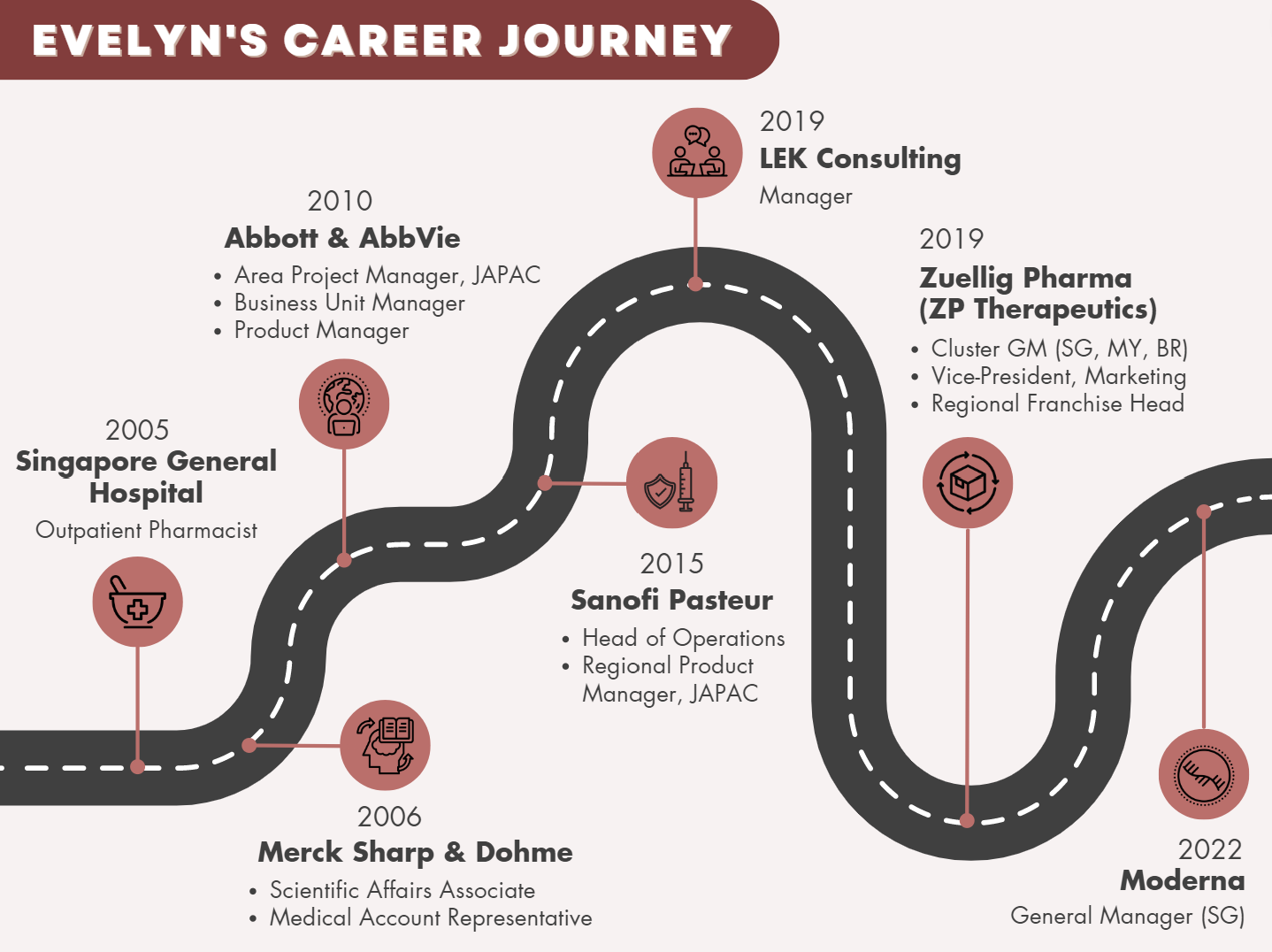
E: When I was a pharmacist at Singapore General Hospital (SGH), I decided to pivot to the pharmaceutical industry mainly because of the breadth of experience and exposure the industry offered. I wasn’t worried about stepping into new roles and across functions, as I see them as new learning opportunities for me to develop new competencies and networks while gaining new horizons of perspectives and valuable experiences.
Over time, I encountered roles that did not have specific job descriptions (JD). I saw these roles as great opportunities to step out of my comfort zone and challenge myself to bring about transformative growth for myself and for the teams I work with. In one of my regional roles, I saw the organisation through the eyes of senior executives, developed strategic business acumen for the region, and polished negotiation and influencing skills as I worked across functions and geographies. Being comfortable and delivering consistent results in roles that do not have a JD was a defining moment of my career because the white drawing space allowed me to listen to the needs of internal and external stakeholders, bring cross-functional teams together to co-develop solutions that would serve the unmet needs of patients and healthcare communities.
With my mentors’ help, I penned down my purpose statement and with it, decision-making with regards to my career became easier. My purpose statement was created based on the concepts of equity, access, and transforming healthcare, communities, and businesses. With it, I became increasingly strategic and purposeful in choosing my roles, which included not niching myself into one path. Hence my career is crafted as a specialist in healthcare marketing and a commercial leader with P&L responsibilities. These different options have provided me with a variety of learning experiences.
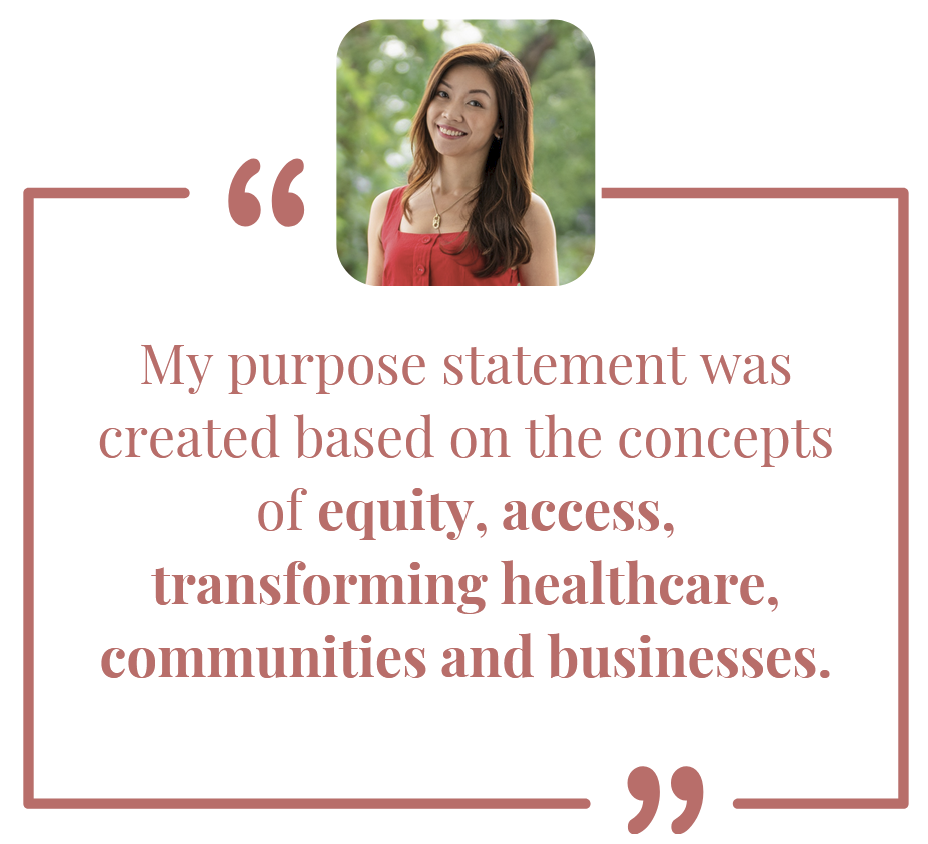
Q: When we think of those with the capacity to change the lives of patients, we often think of people working in hospitals. Many do not know how industry-based pharmacists are also relentlessly transforming healthcare and patient care. Could you share with us what is the connection between industry-based pharmacists and patient care?
E: As a clinical pharmacist, I changed lives one encounter at a time through my daily dispensing and counselling roles. My job was fulfilling because I could touch the lives of individual patients and their families. Then I wondered: “Are there ways where I can bring a bigger impact – something that I can do to touch the lives of more people and leave a legacy?”
As I pivoted to the pharmaceutical industry, I realised I was creating more impact on populations by creating access to innovative medicines and shaping guidelines to enhance patient care. We accelerate first-in-class and best-in-class therapies, providing hope to patients who have exhausted all treatment options. We introduce clinical trials that generate local data and increase Asian diversity and representation. We connect healthcare professionals and patients to communities and shape guidelines to direct evidence-based care to slow disease progression. We advocate and set precedence for reimbursement programmes for needy patients so that they can get financial support for chronic medications and vaccines. We also played a significant role in the fight against the COVID-19 pandemic as a public health partner and remain one as the nation transits to live with the endemic. Even when I am gone, these programmes will continue to benefit patients of the current and future generations!
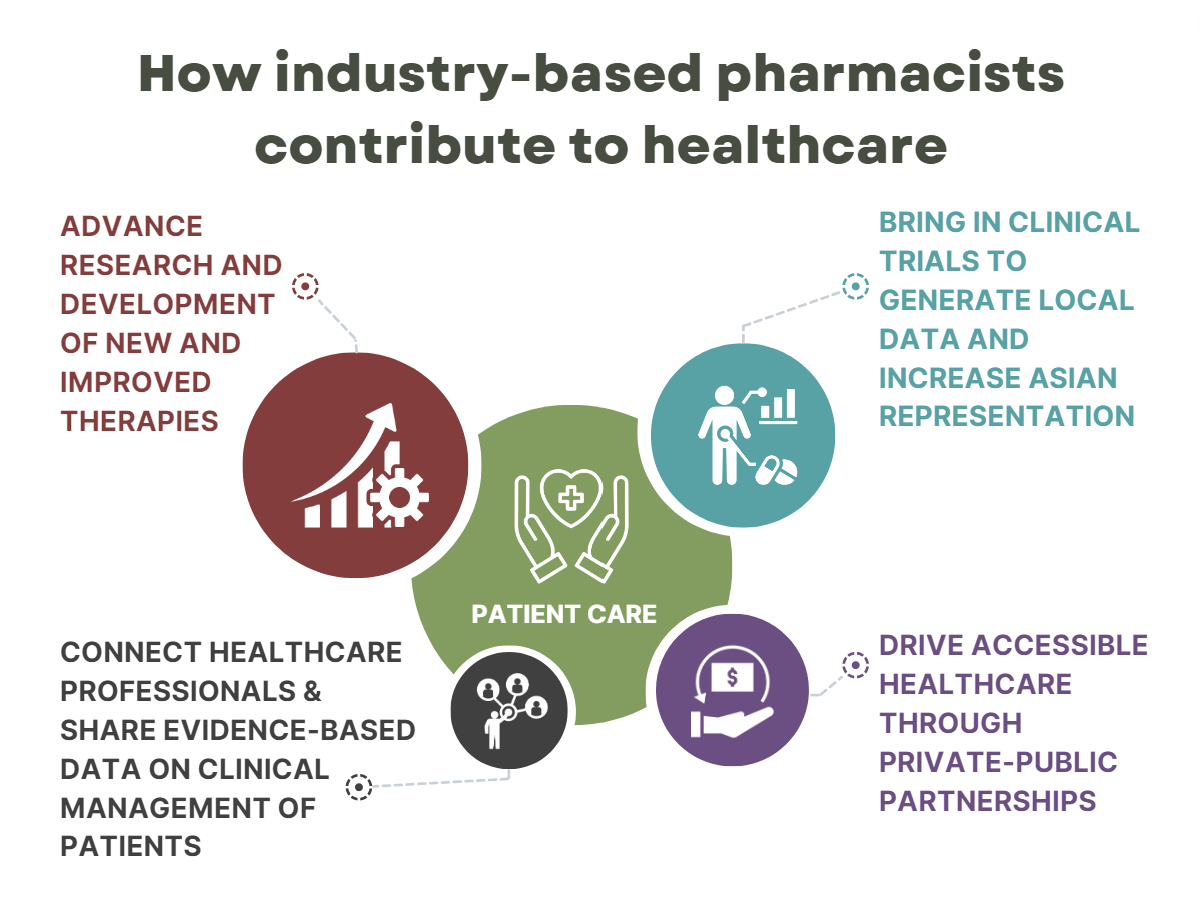
The potential impact we can bring does not stop just at the local level. I remember my team led the access of COVID-19 vaccines in Thailand and the Philippines. We also garnered donations of COVID-19 treatments to patients in Indonesia who did not have access to medications. These are some examples of how we were able to protect and change the lives of patients outside Singapore.
When I saw the impact I could bring to the larger patient populations, I wanted to stretch myself more and contribute further. Perhaps, we are also superheroes working behind the scenes! If future pharmacists can see the tremendous impact we are bringing to public health, we might be able to provide them with more options to contribute to healthcare in unique ways that align with their purpose and dreams.

Q: You have a very rich experience working in various pharmaceutical companies. Any tips for students and alumni on how to manoeuvre their careers?
E: Everyone’s career path is different as each of us is unique. Hence our career paths should be individualised too. Based on my experience, I can share 3 tips from my career journey.
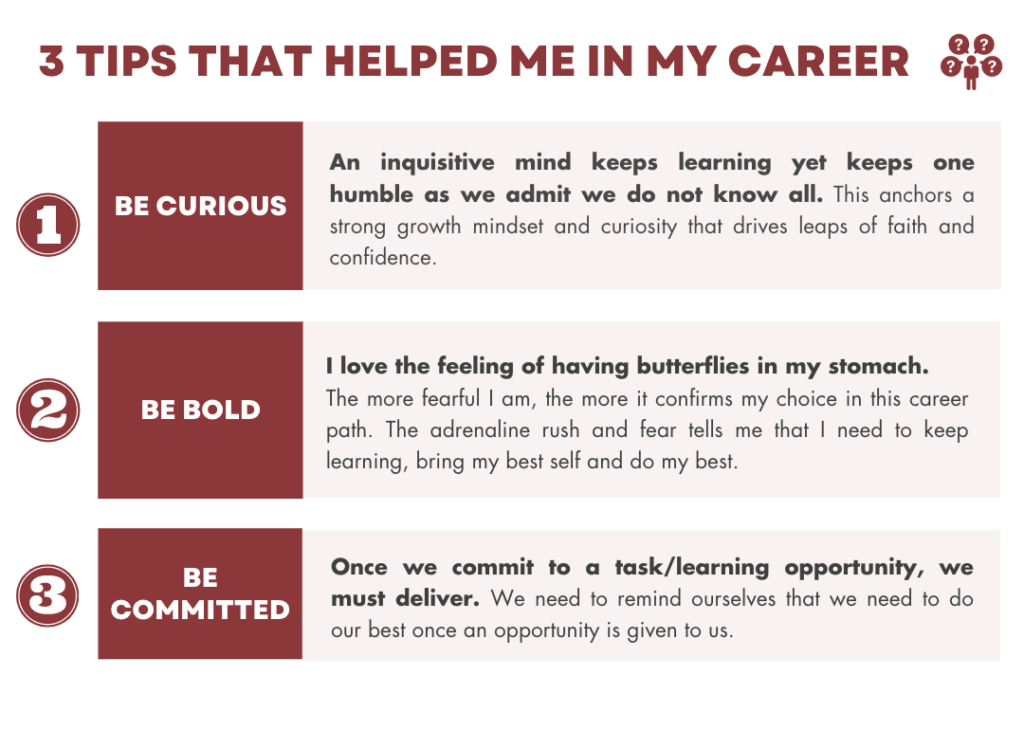
Q: We hear that you’re currently working in Moderna and you have also participated in the NUS immunization workshop. What motivated you to pursue this path? What are your hopes or aspirations in this role?
E: I chose to join Moderna because they were searching for a local leader with the ambition and passion to create change by delivering a new generation of transformative medicines and contribute to Singapore in lasting ways. My task is to use our novel mRNA platform to find solutions to the public health and unmet medical needs while continuing to be a public health partner to maintain resilience against COVID-19 and future pandemics.
At Moderna, I am greeted everyday by colleagues who share the same mindset and motivation – to change the future of medicines. I wanted to challenge myself and my team to reinvent healthcare and not be defined by what was previously possible. Everyone in our company have a common goal to accelerate the development and access of mRNA medicines. We are all aligned and inspired by a common purpose to deliver the greatest possible impact of mRNA medicines to populations and patients. Focusing on five therapeutic areas and having one of the largest clinical development programmes, I am confident that Moderna will create an impact on our population.
Moving forward, I strive to elevate Singapore’s position as an emerging market in Asia so that other countries can accelerate and adopt technology in the healthcare landscape. I also hope to give students more internship opportunities at Moderna to experience how a career is like in this transformative company.
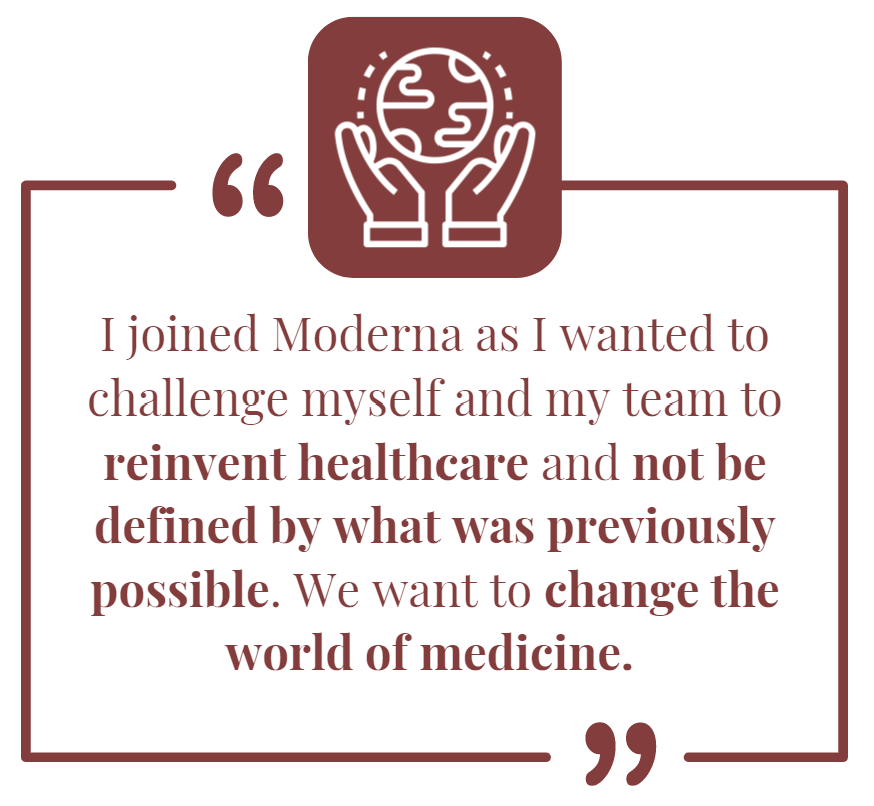
Q: As someone who manages teams at work, what are the qualities you hope to see in young graduates who are seeking to work in the industry?
E: It is important to be patient with the process, but also be hungry to learn and grow.
Each career move should be strategic and well thought out. Each move should also be rational and intentional. For myself, each career move I took has allowed me to learn and stretch myself tremendously, and more importantly, to broaden the impact I can bring to patients, populations, and communities.
If the consideration is to switch roles out of the organization, note that it takes time to familiarise yourself with a new environment before you can start contributing to your new role. You will need to build new networks, mentors, and sponsors. Therefore, it is important to consider staying through until a project is finished and deliver the planned results with the efforts you have sowed. Building strong relationships with medical practitioners and touching the lives of patients requires dedication and time.
Besides being resilient, it is also helpful to be willing to take up stretch assignments. Promotions do not come along all the time and even when the opportunity arises, there would usually be many candidates eligible for the role. Therefore, it is important to prepare ourselves and be consistent so that we are ready when opportunities come.

Q: You are very active in mentorship programmes. What spurs you to take on these roles voluntarily?
E: My involvement in mentorship programmes stems from my desire in paying it forward after receiving mentorship from senior leaders, as well as my passion for diversity, equity, and inclusion, particularly in empowering the next generation of future leaders and accelerating gender equity. Throughout my development years, I was blessed with Chief Executive Officers (CEOs) and regional heads who were generous in giving me their time, mentoring, and sharing their journeys with me. Hence, I would like to do the same for others.
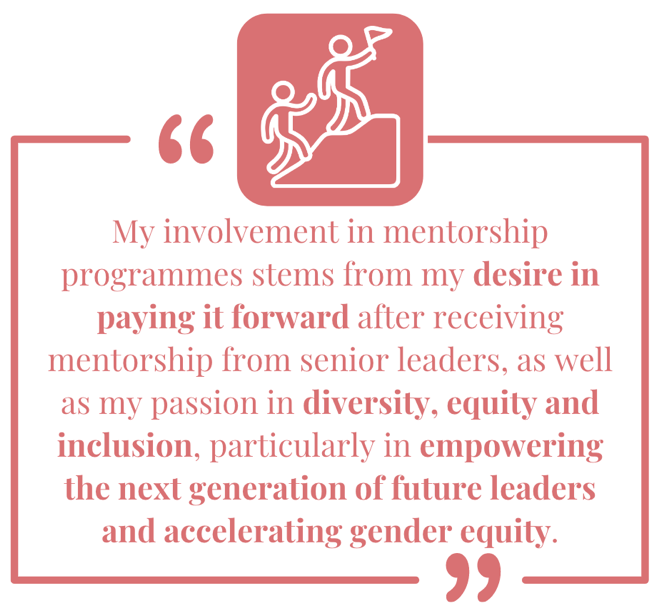
This year, I was inspired to come up with an initiative to exchange ideas and experiences with new people on a regular frequency by taking morning walks at the Botanic Gardens with them whilst getting my exercise. I have also started to volunteer at Singapore Leaders Network Inspiring Girls, an NGO that raises the aspirations of girls. This is in addition to my mentoring commitments which typically involve mentoring social entrepreneurs and start-ups over 3-6 months. For example, I was previously involved in Beyond! Health Hack 2021, which is an online MedTech and digital health hackathon organised by NUS Pharmaceutical Society. I am also a regular mentor with Singapore International Federation (SIF) in their yearly Global Young Social Entrepreneur Programme and currently mentoring a start-up in India that is working on prosthetic limbs. It is meaningful for me as these innovations could potentially address unmet needs in developing countries and I would like to contribute beyond Singapore through mentorship since our country is well poised on healthcare services.
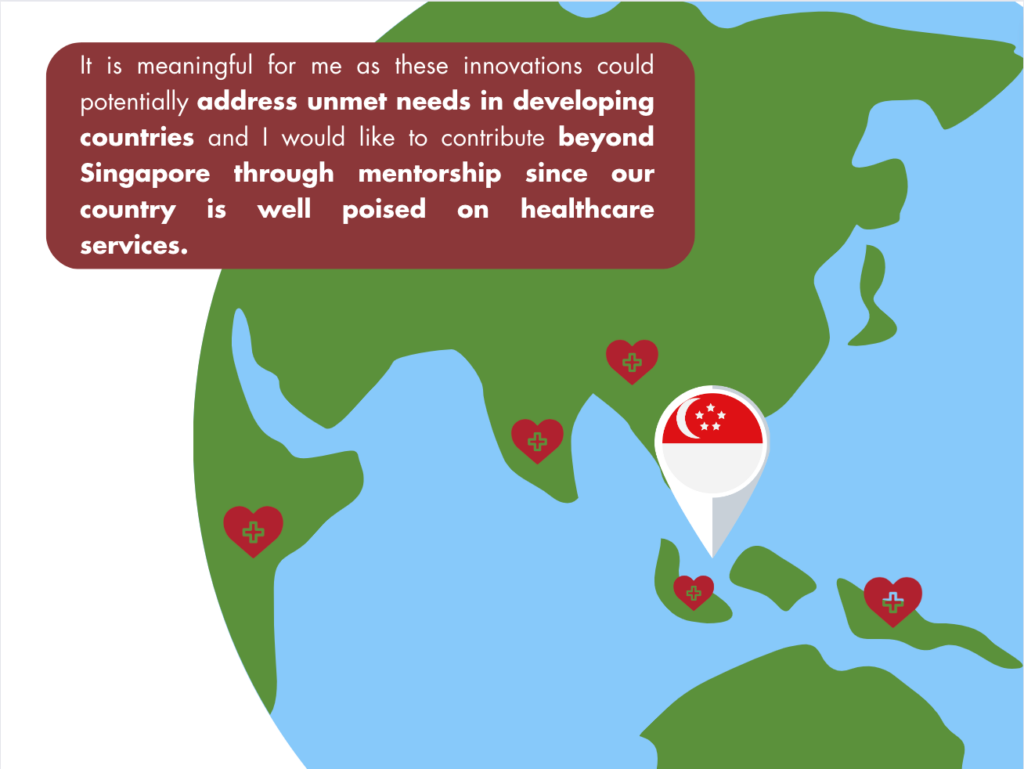
Moving forward, I am open to participating in more mentorship programmes. As an industry pharmacist who has taken on various cross-functional local and regional roles, I would be able to gather like-minded individuals who are willing to pay it forward and provide advice that would be helpful to the future generations of Pharmacists and explore possibilities to address societal issues as our time here is limited.

Q: How has your NUS pharmacy education helped you in your career?
E: My pharmacy education has been helpful to me even until now! Firstly, pharmacy education developed my appreciation of science, helping me pick up scientific knowledge very quickly as I transit across different therapeutic areas in my career. It also enabled me to share facts, data, and science, and to communicate what it means to various audiences and stakeholders. This background helped me to connect the dots between science, data, and healthcare needs to find impactful solutions for patients, populations, and society.

Q: What are your fondest memories that keep you connected with NUS Pharmacy?
E: Back in NUS, I was very active in leadership and publicity roles for the NUS Cultural Activities and Community Service Club, Students’ Sports Club (NUSSSC), and various activities in my hall. I also organised the pharmacy orientation camp and was involved in regional pharmacy events as the publicity and marketing lead.
The fondest memories I have of NUS, however, are not the events I organised nor activities I participated in. Instead, my biggest gain is my closest friends from Pharmacy school. They are dear to me as they have journeyed with me through the many chapters of my life, and I am extremely thankful for them.
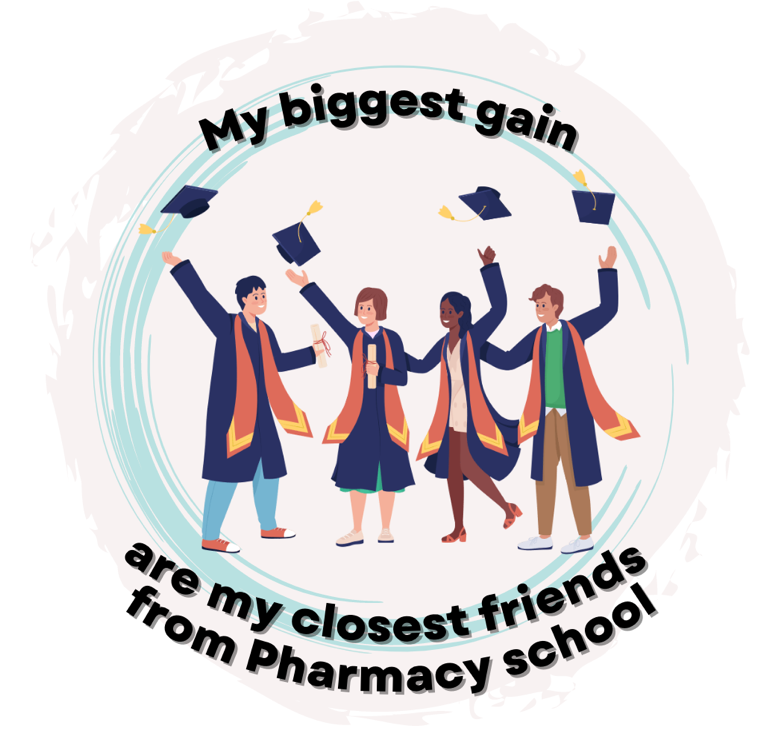
We sincerely thank Evelyn for taking the time to share her inspiring journey, as well as her perspectives on the value that industry-based pharmacists bring to healthcare. We wish her the very best in her pursuits and continuous strive for excellence!
Article by Koh Wern Xuan, Chloe, Kuu Wei Xiang Nicholas, Toh Li Ying and Wong Rong Yao, Lewis (Year 4 Pharmacy students)
Share this article:
Stay connected with NUS Pharmacy!
Receive PharmConnect Newsletters & announcements by NUS Pharmacy.
